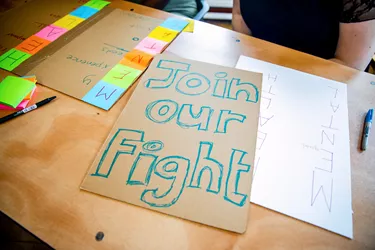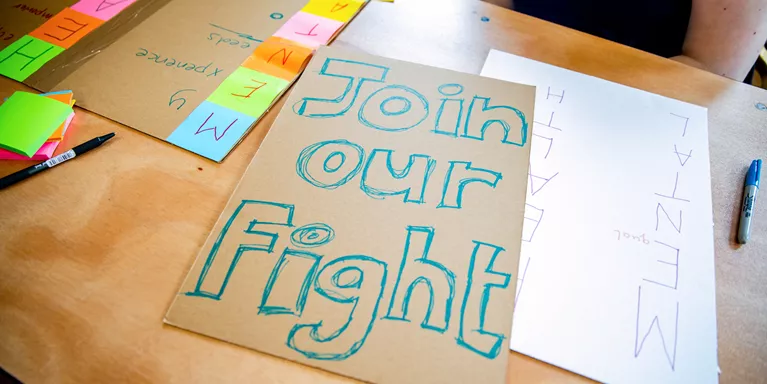Speaking out is the only way to end stigma
Pandora blogs about how important talking is to changing attitudes.
This is a guest blog from Pandora. It was part of a series to highlight the now-defunct campaign to end mental health stigma, Time to Change, which closed on 31st March 2021.
I consider myself a fortunate person in that there are a wonderful – and rather diverse – range of people that I have the privilege of calling my friends. Generally, I've been very open with them and my relatives alike about my mental health difficulties – but there's one group with whom, until recently, I tended to keep my mouth shut.
My partner is partially sighted, and as such, his primary education was delivered in a school specialising in teaching children with visual (VI) and auditory impairments. After reuniting with a number of his schoolmates in his adulthood, I was pleased to also make their acquaintance. I am glad to report that I now consider them my friends.
However, one thing that repeatedly surprised me about these otherwise lovely people was their attitudes to my mental illness. They are open about their disabilities around the dinner table. More formally, they vocally demand reasonable adjustments at work, raise money for related charities, and campaign politically on VI related issues such as traffic calming and electronic accessibility. I think it's brilliant.
You can tell there's a 'but' coming, can't you? Here it is. In my view, if you are pro-disability rights – as every right-thinking person should be – then you should be inclusive about the meaning of the term disability. Unfortunately, mental health problems can represent potentially very severe disabilities, just as physical ones can.
This is something my friends didn't seem to realise. One night over dinner, I remember that after they talked about VI issues, I shifted the conversation to the barriers I had faced due to my disability. The specifics are lost to the passing of time, but I think I was alluding to the HR problems I'd faced during a depression-fuelled absence from work.

My commentary, delivered in my usual matter-of-fact tone, was met with a stony, almost horrified silence. People started staring at their food or fiddling with their wedding rings. An approaching waiter reversed back into the kitchen, having felt the tension emanating from our group. And all the while I sat there, genuinely mystified, thinking, “what did I say?!” Lest I ruin the rest of the evening, though, I decided to keep schtum thereafter, and eventually, someone (quite deliberately) changed the subject, and things moved on.
That was several years ago, but if I’m brutally honest, the episode still cuts me to the core when I let myself think about it. Why is someone else’s disability considered more socially “acceptable” than mine? Why do mental health conditions still exist only in the realm of whispered taboo and under-the-carpet brushing?
This was only my second proper encounter with the stigma that continues to permeate discussions pertaining to mental health (or lack thereof). I don’t blame my friends personally: they are a product of a society and culture that remains scared of and ill-informed about psychiatric disorders, and they’re far from alone.
My first significantly prejudicial experience was in my most recent job (mentioned above), in which I had initially gone off sick with “depression”. This was deemed a common and ordinary complaint by my employers, but when my condition failed to improve, and I was eventually diagnosed with, initially, borderline personality disorder and bipolar type II (now changed to complex PTSD and either bipolar I or schizoaffective disorder – go me!), their attitudes mysteriously changed. Oh, we really were in the mental territory there, weren’t we? They couldn’t have that, now could they?
(I’m being slightly unfair here, as when I was eventually dismissed, I had been absent over a year – by leaving the organisation was therefore both legal and fair. However, the paradigm shift between their tolerance before and after my diagnoses was very evident).
Rather than incite meekness, however, if anything, these two incidents encouraged me to speak out more about my mental health troubles, as I wrote about in my World Mental Health Day post. It started off by writing – anonymously – on my blog (I still write pseudonymously, incidentally, but that’s because I have no choice but to protect some key personnel discussed therein), but in time I found myself openly discussing mental health in ‘real life’ too. Besides those already discussed, I only remember one particularly negative reaction – when explaining to a friend of my boyfriend’s that I was not working due to “being mental,” he replied, “is that ‘I Can’t Be Bothered With Work-Itis’ then?” Not a pleasant comment by any means – but by and large, people have been accepting, willing to listen and mostly sympathetic. I even revealed the severity of my psychotic and dissociative symptoms to an ignorant and rather set-in-their-old-fashioned-ways aunt and uncle recently; I was quite surprised when they didn’t back away in petrified horror but instead proffered me their genuine good wishes and a listening ear.
Again, though, there’s a ‘but’. Two, actually. Firstly, it is not easy to be so unabashed about this subject to other people (particularly, I would suggest, acquaintances or strangers – you have no clues to enable you to gauge what their reaction might be). As a general rule, I’m remarkably passive in the arena of real life, but I am both blessed and cursed in having something of a bolshy streak when I feel I’m being mistreated, and I think it’s that force that has driven me to speak up. Secondly, even though I have received a number of pretty positive reactions to my disclosures, stigma still exists. There are still those who demonise us as loons or scroungers who should be locked up in an asylum or get back to work, respectively (though, of course, many people with mental health problems do work). Admitting to mental health issues in such circumstances can seem like a dangerous thing to do.
I think, though, that there is ultimately good news. As many people familiar with Mind will know, the Time to Change campaign has been granted another four years’ worth of funding, which means that the very meaningful in-roads the initiative has already made can be further built upon.
As Time to Change says, we shouldn’t be afraid to talk about mental health. I know it’s easy for me, an anonymous stream of words on a blog post, to say, but I really believe that speaking out is one of the key ways in which we can break down the societal barriers we’re presently forced to face. And although it sounds naïvely simplistic, if people refuse to be educated on the subject, if they make active decisions to remain prejudiced and wilfully ignorant, well – it really is their problem, and not ours. We deserve respect. We don’t deserve to have to hide behind a wall of silence.
Oh, and my visually impaired friends? One got a job in mental health training and now often shares my material at work. Another recently ran a fund-raising event for a mental health charity. Most importantly to me personally is that, after a lot of determined “I am going to talk about this,” they are now willing to openly discuss my difficulties with me.
Proof, to me, that negative attitudes can change.

Information and support
When you’re living with a mental health problem, or supporting someone who is, having access to the right information - about a condition, treatment options, or practical issues - is vital. Visit our information pages to find out more.
Share your story with others
Blogs and stories can show that people with mental health problems are cared about, understood and listened to. We can use it to challenge the status quo and change attitudes.

















